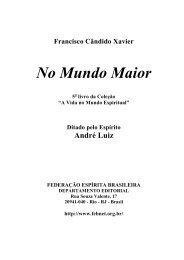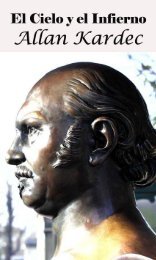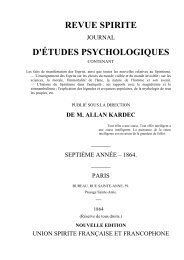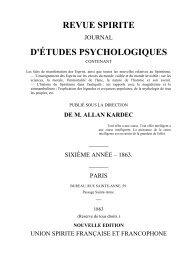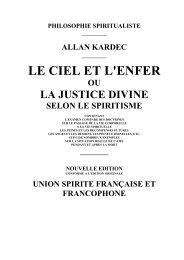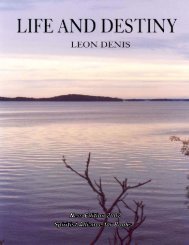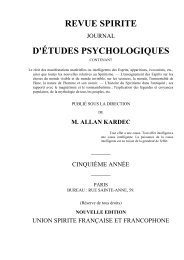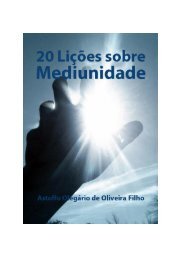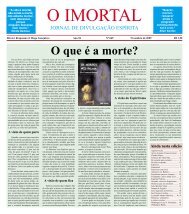PDF version - Geae
PDF version - Geae
PDF version - Geae
Create successful ePaper yourself
Turn your PDF publications into a flip-book with our unique Google optimized e-Paper software.
young men, but to many men of our time and generation in whom we recognize a moral lassitude and<br />
weakness.<br />
Frederick Myers, author of Human Personality, has also said on this subject, ‘Pessimism is the moral<br />
malady of the times; there is a lack of confidence in the true value of life.’ The doctrines of Nietzsche, of<br />
Schopenhauer, of Haeckel, have largely contributed toward developing this state of things. Their influence has<br />
been far-reaching. To them we may attribute the skepticism and discouragement, in a great measure, which<br />
emanates from the contemporaneous mind: the utter lack of all that makes the ardor of life, its joyousness, its<br />
confidence in the future - those virile qualities of the race.<br />
It is time to battle with vigor against these funeral doctrines, and to seek outside of the old official<br />
beliefs new methods of instruction, which respond to the imperious needs of the present hour. We must<br />
prepare souls for the necessities, for the combats of actual life, and life further on. We must above all teach<br />
human souls to understand and develop, in view of the final end, the latent forces which sleep within.<br />
Until now, thought has been confined in narrow circles, religions, schools, and systems that exclude<br />
and combat all ideas at variance with their own. We must rise out of this rigid circle, and give our thoughts a<br />
larger freedom; every system contains a part of the truth, no one contains the entire truth. The universe and life<br />
have aspects too varied, too numerous for any one system of teaching to embrace wholly.<br />
We must take the fragments of truth which each contains and fit them together until they form a united<br />
pattern; then add to them the aspects of truth which we discover from day to day, through the majestic<br />
harmony of our awakened thought. The decadence of our epoch comes largely from the imprisoned and<br />
restricted state of the human mind. 2 We must stir it out of its inertia and its creed-bound limits, and lift it<br />
toward high altitudes without losing sight of the solid base, which affords it and enlarged and renewed science.<br />
This science of the future we must work to establish. It will procure the indispensable criterion, the means of<br />
verification, and the control without which thought, left to its freedom, risks the danger of losing its way.<br />
We have said that trouble and incertitude are everywhere found in our social conditions. Within and<br />
without, there is a state of inquietude. Under the brilliant surface of a refined civilization is hidden a deep<br />
malady. Irritation increases in social circles; the conflict of interests and the battle for life becomes every day<br />
more acute.<br />
Humanity, weary of dogmas, and speculations without proof, is plunged in materialism or<br />
indifference. From whence, then, comes this doctrine? Toward what abyss are we being drawn? What new<br />
ideal will come to give man the confidence in the future and ardor for achievement? In the tragic hours of<br />
history, when the situation seemed desperate, succor was at hand. The human soul cannot perish: in the<br />
moment when our old faiths are hidden by a veil, a new conception of life and destiny, based upon science and<br />
facts, reappears. The Great Tradition is revived under new forms, larger and more beautiful. It reveals to all a<br />
future full of hope and promise. Salute, then, the new reign of the idea, victorious over matter, and work to<br />
prepare fair ways for its footsteps.<br />
The task is great, and the education of mankind must be entirely reconstructed. This education, we<br />
have seen, neither the university nor the Church is prepared to give, since neither possesses the necessary<br />
synthesis to cast light upon the pathway of new generations. One doctrine alone can offer this synthesis - that<br />
of scientific spiritual research.<br />
Already it shows a horizon to the world, and promises to illuminate the future. And this philosophy,<br />
this science, free, independent, liberated from all official restrictions, from all compromising politics, is adding<br />
every day new and precious discoveries to its storehouse of knowledge. The phenomena of magnetism, of<br />
radioactivity, of telepathy, are but applications of the one principle, the manifestation of the One Law, which,<br />
regulated at the same time, beings and universes.<br />
A few more years of patient labor, of conscientious experimentation, of persistent research, and the<br />
New Education will have its scientific formulae, its essential base; this event will be the grandest fact since the<br />
coming of Christianity. Education, we all know, is the most powerful factor in progress. It contains the germ of<br />
the entire future; but to be complete, education should inspire the mind of man to study life in two alternating<br />
forms - the visible and the invisible: ‘Life in its plenitude, in its evolution towards the summit of nature and of<br />
thought.’<br />
2 These lines were written before the war. We must recognize that, during the course of this gigantic strife, the young Frenchmen have shown a heroism<br />
above all eulogy; but the national education does not show in that, it is rather the result of sleeping qualities which have wakened in the heart of the race.<br />
10



